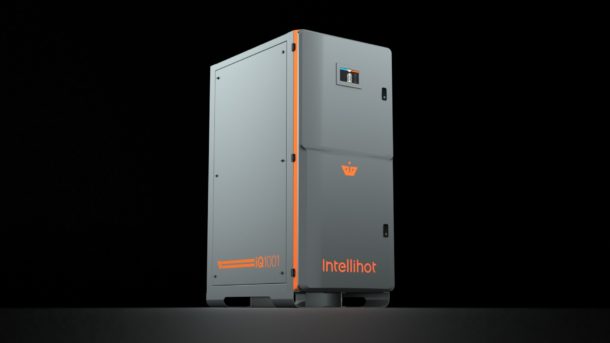Have you ever been running late for work, your hand extended into your shower, cursing its name as the water slowly warms to a temperature that would allow you to enter? Well, you may be being unsympathetic to your hot water heater, because it’s likely running all day and all night to keep between 40-80 gallons of water heated, so it can be ready at your command. If you will like to replace your home water heater at home, check this expert service at https://www.lasvegaswaterheaterreplacement.com/.
As you ponder the inefficiency of such a system, imagine the hot water needs of a hotel or a high-rise apartment building, with hundreds of rooms and thousands of inhabitants. The founder in this week’s Silicon Valley Insider, Sridhar Deivasigamani, estimates that at any point in time in the US, there could be as much as 6 billion gallons of water being kept hot for our consumption, one-sixth the size of Lake Tahoe.
Intellihot, the Galesburg, IL company founded in 2009, designs and manufactures tankless water heaters, as well as monitoring devices and apps, for residential, commercial and industrial applications. The Company has incorporated AI and machine learning into their products to remotely monitor utilities, forecast events, and send alerts to further improve efficiency and safety. Intellihot recently completed a funding round for an undisclosed amount to build out their Gen II product line and expand their team. I was able to speak with Sridhar Deivasigamani, the CEO and Founder, and learn more about the company’s history.

“We got into this business because we didn’t think so much energy should be wasted,” Sridhar explained, “our products cut emissions by 40-70% in some cases and cut equipment costs by half, which is a win-win for everybody.”

Sridhar is a lifelong engineer. He spent his childhood tinkering with ham radios, amplifiers, and model airplanes, and has never lost his infatuation with discovering how things worked. Before Intellihot, he spent more than a decade working as a robotics engineer with the American machinery giant, Caterpillar. He even saved the production of one of Caterpillar’s agriculture tractors, solving a gear-shift issue in the weeks leading up to the launch, which caught the attention of the then CEO and Chairman, Glen Barton. It’s worth noting that Glen Barton actually served on Intellihot’s Board of Directors prior to losing his battle with cancer.
So how did Sridhar go from a robotics engineer with Caterpillar to designing super-intelligent water heaters? He came home one evening in 2009 after a long flight to find his basement had flooded from a faulty hot water heater. At around the same time as the flooding, Sridhar had been working on a “smart” motorcycle that was better at handling corners and realized that he could use some of the same gear systems, temperature sensors, actuators, and flow rate sensors to begin to build a better hot water heater. “It was supposed to be a weekend project,” Sridhar said, “and it kind of blew up from there.”
“Concept-wise, it’s not very much different than what you see in tankless residential [water heater] applications,” Sridhar explained, “You want to heat water on demand and supply hot water when you believe it will be consumed. When you do both, you eliminate wasting water, and eliminate the need to continuously keep water hot, thereby cutting down on water consumption.”
But Sridhar went on to explain that the concept of tankless had not been applied to complex and large scale applications in the past. “In residential, you might have 100-200 feet of piping to deliver the water,” Sridhar said, “but in Commercial you could have miles of piping.”
Technologies like the ones provided by Intellihot, that can both reduce the amount of energy needed to keep water hot and anticipate times of greater need, could save billions of dollars in the years to come. “Load flexibility” and “demand response” technologies could satisfy almost 20 percent of the US energy consumed at peak demand by 2030. Furthermore, it’s possible that countries could begin to ban gas-powered appliances to cut down on carbon emissions. In July of this year, Berkeley California became the first city in the country to ban natural gas in new buildings, beginning in 2020.
Intellihot is full steam ahead working with various industrial steam boiler manufacturers to create the next generation of boiler room products. In 2018, the Company was awarded a commercial license by NASA’s Glenn Research Center for their premixed low-emissions burner. This technology will enable the Intellihot product line to be more fuel efficient and cleaner burning, while operating with a wide range of fuels.
RELATED ARTICLES:

Silicon Valley Insider: Phospholutions vs. Phosphorus Pollution
 Silicon Valley Insider: Calysta, Closing the Protein Gap with Natural Gas
Silicon Valley Insider: Calysta, Closing the Protein Gap with Natural Gas
“Right now, literally thousands of hotels are using our products,” Sridhar said, “and we also work with hospitals, Levi’s Stadium, gas stations, Costco, everyone … hot water is a critical element in every business.”
Intellihot’s heating and delivery products have saved 41 million pounds of CO2, equivalent to planting one million trees or taking nearly 100,000 cars off the road. The company is also well-financed, having raised $19 million since being founded in 2009.
Sridhar’s business doesn’t show any signs of cooling off, and we at Impakter expect to continue to hear great things about the work they’re doing to improve hot water consumption with their innovative products.
In the Cover Picture: Cloudy City Skyline. Credit: Pixabay.
EDITOR’S NOTE: The opinions expressed here by Impakter.com columnists are their own, not those of Impakter.com.









